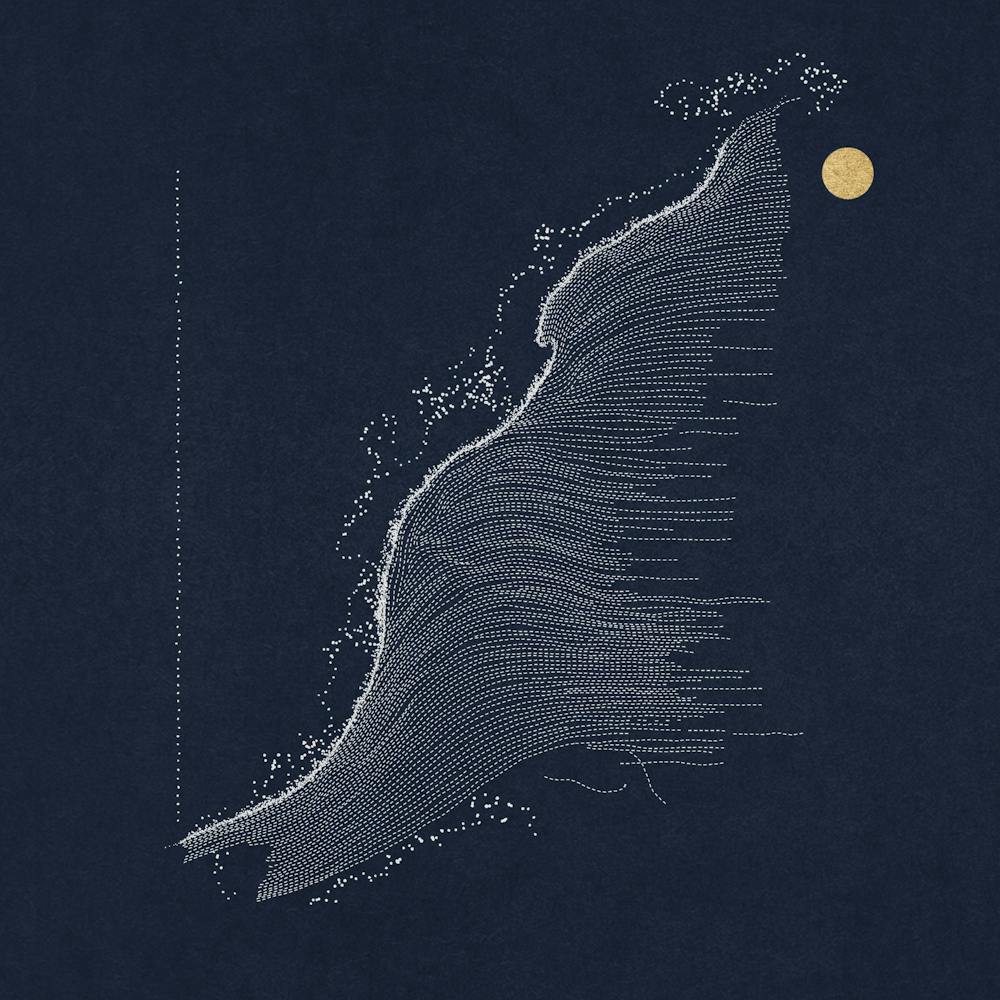Review: Quadeca rises from the sea fully-formed on “Vanisher, Horizon Scraper”

Review: ★★★★
Top track: “Godstained”
The first notes you hear on Quadeca’s newest album “Vanisher, Horizon Scraper” are from Chico Buarque’s seminal Brazilian classic “Construção”. By opening this project with that sample, the former “Bad Internet Rapper,” notorious for getting in a beef with fellow internet personality KSI, seems to be saying that the project his audience is about to hear will be as ambitious as Buarque’s classic.
From generic pop trap to emo rap experimentation on 2021’s “From Me To You”, Quadeca has seem to finally have found his voice on his last three projects “I Didn’t Mean to Haunt You,” “Scrapyard” and now with “Vanisher, Horizon Scraper.” The story of Quadeca has been one of musical maturation, and we’re in the best chapter yet.
The album’s first track “No Questions Asked” opens with those Chico Buarque notes and immediately envelops one in its unique soundscape - classical, electronic and folk-driven in equal measures. The refrain “I’ll be there when no one is” repeats as the music ebbs and flows like waves crashing. There is an aquatic feeling to this whole project, likely intentional as the project’s central narrative thread is of a voyager crossing the sea.
That narrative becomes clearer on the second track “Waging War”, with bars like “Who am I when the light is low, and there's no horizon? / Who am I when I wash ashore? I can't visualize it.” With lines like these and “Waging war (Who am I to that open door that I'm going towards?) / Racing forward (Who am I to the blinking light that's been keeping score?)”, it's apparent that the album’s narrator is going through an existential crisis and is using this journey across the sea to find themselves in their mental storm. “Waging War” is interesting but suffers from some slight sonic disconnectedness in a way the rest of the album does not. And while that might be a musical reflection of the existential anxiety depicted, the rest of the album generally accomplishes this anxious feeling with more sonic focus.
If you weren’t listening closely enough to the vocals, you would be forgiven for thinking the project’s next track “Ruin My Life” was by “Age of Adz”-era Sufjan Stevens. It's an experimental track with electronic and psychedelic flourishes but centered by a beating folk heart. “I might have to ruin my life to make it mine” is the thesis of this track, illustrating the narrator may need to go against expectations and escape to find himself. The song’s ending refrain “what have you done” represents the lingering doubts over the decision.
One thing you'll notice throughout this album is that lyrics are somewhat sparse, and much of the thematics are expressed through the sonics and repeating lines. Quadeca’s words are passionately delivered, but sometimes they can seem one-note and on the nose. His lyrics do have the potential to be stronger and more illustrative and he shows that he does have that ability on the next track, “Godstained” –- the album’s standout.
Backed by lush bossa nova and jazz instrumentation, Quadeca sings about finding a message in a bottle at sea. The narrator is excited that he will find some meaning in the bottle, but ultimately realizes that it contains nothing of significance. Of the metaphorical conceits that make up many of the songs on this project, “Godstained” is one of the most lyrically and sonically interesting examples, telling a story of expectations and disappointment over gorgeous jazz-folk. Oleka, who has backing vocals on many tracks across the album, has one of her best performances here, adding to the song’s ethereality.
The next few songs feature many of the sounds Quadeca has come to master as he explores everything from getting old and failed relationships to missed opportunities and failure. The highlights of this middle leg of the album include the psychedelic and glitchy cloud rap of “At a Time Like This,” the baroque folk waltz of “Monday” and the indie pop and hip-hop fusion of “That’s Why.”
“Thundrrr” ramps up the energy from the middle section of softer songs with abrasive, blaring synths and distorted percussion. On this track, the narrator no longer seems existentially anxious but self-assured and almost egotistical. The song plays like a coping mechanism, a reaction to insecurity.
The next track, “The Great Bakunawa,” keeps the energy going with a great Danny Brown feature. The beat begins ominously sounding like the part of the horror movie that comes before the jumpscare and then the drums kick in as Quadeca says “When the sun comes down, it's fallin' right? / It's the end of the world if you call it right.” The Great Bakunawa is a sea dragon from Philippine mythology. To prevent the serpentine dragon from eating the moon, people needed to play music to ward it off. Brown raps as the voice of the dragon, threatening to consume the moon and the narrator.
Just as the narrator’s journey has reached the peak of its tumultuousness, the project once again returns to a more intimate soundscape with “Forgone”. “Forgone” repeats the chord progression of “Monday” and like that song, “Forgone” also centers on the narrator reminiscing on a relationship. The intimate atmosphere matches the lyrics of the song as the narrator remembers how his partner was “through it all…the one that remains.” However, by the last verse, it becomes clear that this relationship is no more. Over lush strings and atmospheric drums, Quadeca isn’t able to finish the verse, singing “Holding you tight like a bear / But I was the only one there / And I can't return as the same / All I can do is re—.”
The final song “Casper” is more a Maruja track then a Quadeca song. Maruja’s Harry Wilkinson speaks as the voice of God, reciting poetry that ties back to multiple songs across the album. Over dark and atmospheric experimental rock, it becomes clear that the narrator has reached death, yet Wilkinson’s God reassures him that “heaven’s open wide, it’s hell on earth he knows.”
“Vanisher, Horizon Scraper” is a remarkable journey of self-discovery and emotional reckoning, showcasing Quadeca's evolution as an artist. The album blends experimental production with deeply personal themes, exploring existential questions and the tension between expectation and reality. While the lyricism occasionally feels simplistic, tracks like “Godstained” highlight his ability to craft profound, vulnerable narratives. The album’s sonic depth and emotional weight make it a standout in Quadeca’s discography, as he navigates the complexities of life, loss and self-realization. “Vanisher, Horizon Scraper” is a cathartic exploration, cementing Quadeca’s place as a uniquely ambitious voice in modern music, with plenty of room for growth on the horizon.
More from The Rice Thresher

Thresher’s guide to arts and entertainment in Houston
New to the city? Unsure how to spend your time procrastinating on homework? You’re in luck — Houston is a playground if you know where to look, and most of it is an easy metro ride or short commute from campus. Here’s a starter pack of spots that deliver fresh air, brain food and the occasional “wait, this is in Houston?” moment.

Thresher’s Lollapalooza report: Who ruled Grant Park?
Chicago’s Grant Park ran on pure dopamine this weekend — surprise debuts, late-but-worth-it arrivals, confetti, fireworks and at least three mass sing-alongs an hour. From Joey Valence & BRAE road-testing new indietronica to A$AP Rocky cracking open his vault, T-Pain turning the field into karaoke and Olivia Rodrigo summoning Weezer, Lollapalooza felt like a live-wire mixtape. Doechii built a universe, TWICE made history and Sabrina signed off with a superstar-cementing finale. Here’s what actually lived up to the skyline.
“Ginny & Georgia” Season 3: A Messy, Magnetic Villain Origin Story
I’ll admit it: I came into “Ginny & Georgia” expecting another glossy Netflix soap that looks great in a weekend binge but evaporates from memory by Monday. By the end of season three, I realized I’d been doing something I rarely do with shows like this: I was taking notes. Not on the plot (though it’s as twisty and outrageous as ever), but on the characters. I loved them. I was grinning from ear to ear watching them scheme, stumble and monologue their way through impossible situations. That’s when I knew: this show had done something right.


Please note All comments are eligible for publication by The Rice Thresher.